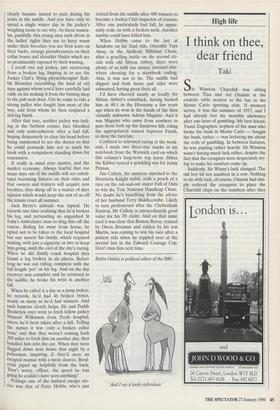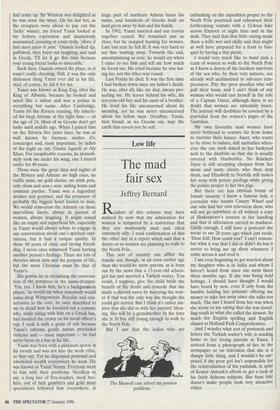High life
I think on thee, dear friend
Taki
Sir Winston Churchill was sitting between Tina and Ari Onassis at the roulette table nearest to the bar in the Monte Carlo sporting club. If memory serves, it was the summer of 1957, and I had already lost my monthly allowance after one hour of gambling. My best friend, Yanni Zographos, nephew of the man who broke the bank in Monte Carlo — bought the bank, rather — was lecturing me about the evils of gambling. In between lectures, he was punting rather heavily. Sir Winston wasn't having much luck either, despite the fact that the croupiers were desperately try- ing to make his numbers come up.
Suddenly, Sir Winny's luck changed. The old boy hit ten numbers in a row. Nothing to do with luck, of course. Onassis had sim- ply ordered the croupiers to place the Churchill chips on the numbers after they had come up. Sir Winston was delighted as he was none the wiser. On his last bet, as the croupiers were about to pay out the `lucky' winner, my friend Yanni looked at my forlorn expression and shamelessly announced, pointing at yours truly, 'Alors, it faut aussi payer le petit.' Onassis looked up, guffawed, then burst out laughing, and said in Greek, 'I'll let it go this time because your young friend looks so miserable.'
Back then, Onassis owned the place, so it wasn't really cheating. Still, it was the only dishonest thing Yanni ever did in his life. And, of course, he did it for me.
Yanni was known as King Zog, after the King of Albania, because he looked and acted like a sultan and was a prince in everything but name. After Cambridge, Yanni hit the Riviera running. He inherit- ed his large fortune at the right time — at the age of 24. Most of us Greeks don't get lucky until middle age. When I joined him on the Riviera five years later, he was as well known by barmen, maitre d's, concierges and, most important, by ladies of the night as, say, Gianni Agnelli or Aly Khan. For inexplicable reasons, he immedi- ately took me under his wing, one I stayed under for 40 years.
Those were the great days and nights of the Riviera and Athens: no high rises, no traffic jams, no gold chains, no stink pots, only clean and azut:. seas, sailing boats and constant parties. Yanni was a legendary drinker and gourmet, and the possessor of probably the biggest heart known to man. We would criss-cross the Atlantic on those marvellous liners, always in pursuit of women, always laughing. It might sound like an empty and superficial life, especially as Yanni would always refuse to engage in any conversation about one's spiritual aspi- rations, but it had a unique quality. In those 40 years of close and strong friend- ship, I never once witnessed Yanni hurting another person's feelings. There are lots of theories about duty and the purpose of life, but the most Christian must be that of Yanni's.
His genius lay in trivialising the conversa- tion of the pompous or the name-dropper. `Yes, yes, I know him, he's a backgammon player,' he would say when somebody would name-drop Wittgenstein. Royalist and con- servative to the core, he once described to me in detail how he knocked out a commie who, while riding with him on a Greek bus, had insulted the crown on his naval officer's cap. I took it with a grain of salt because Yanni's extreme gentle nature precluded violence and — more important — he had never been on a bus in his life.
Yanni was born with a platinum spoon in his mouth and was not into the work ethic, as they say. Yet he dispensed personal and emotional wealth everywhere he went. He was known as Yanni Nanny. Everyone went to him with their problems. Needless to say, a long line of free-loaders, stock bro- kers, out of luck gamblers and gold mine speculators followed him everywhere. A large part of northern Athens bears his name, and hundreds of Greeks built on land given away by him and his family.
In 1982, Yanni married and our travels together ceased. We remained just as close, but he stopped hunting for women. Late last year he fell ill. It was very hard to see him wasting away. Towards the end, uncomplaining as ever, he would cry when I came to see him and tell me how much he loved me. He cried because he was los- ing me, not the other way round.
Last Friday he died. It was the first time I had broken down since my father's death. He was, after all, like my dad, always pro- tecting me. He leaves behind his wife, his ten-year-old boy and his saint of a brother. He lived his life unconcerned about its meaning, yet he was never unconcerned about his fellow man. Goodbye, Yanni, best friend; as we Greeks say, may the earth that covers you be soft.



























































 Previous page
Previous page